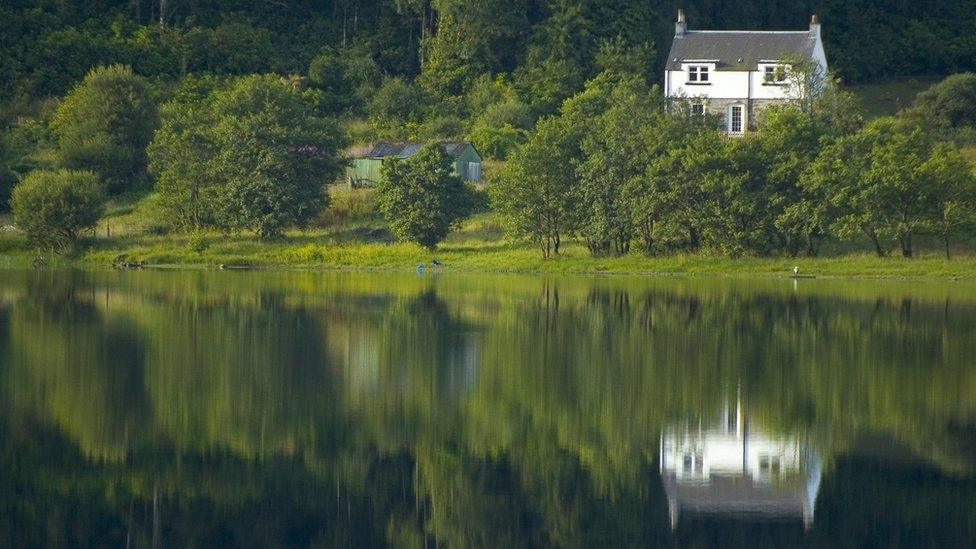BT offers universal broadband in place of regulation
- Published

Some remote homes have struggled to get decent broadband connections
BT has offered to provide the infrastructure for 99% of premises in the UK to get broadband speeds of at least 10 megabits per second by 2020.
If accepted, it would mean government-proposed rules, allowing those living in remote areas to demand broadband, were unnecessary.
BT says it would invest up to £600m and coverage would be universal by 2022.
About 1.4 million households currently cannot get speeds above 10Mbps, according to Ofcom.
This figure is disputed by a group of MPs who say there are a further 5.3 million who have not chosen to take up faster broadband services, some of whom may also not be able to get 10Mbps speeds.
In a recently published report, they called on regulator Ofcom to more clearly distinguish between the take-up and actual availability of fast broadband.
The government has proposed a universal service obligation (USO), designed to help remote households get fast broadband more quickly, by granting them the right to request broadband speeds of at least 10Mbps - speeds which the Department for Digital, Culture, Media and Sport says would "meet the typical needs of a family". That proposal is currently under consultation.
BT's alternative proposal would see the company rolling out the necessary infrastructure "proactively" rather than waiting for a request. The investment would be recouped through customers' bills.
'Warm welcome'
The government will now consider whether to abandon the USO in light of BT's offer.
The Department for Digital, Culture, Media and Sport said it would consult on BT's proposal, adding that, if the offer was accepted, it would be legally binding.
Culture Secretary Karen Bradley said: "We warmly welcome BT's offer and now will look at whether this or a regulatory approach works better for homes and businesses.
"Whichever of the two approaches we go with in the end, the driving force behind our decision-making will be making sure we get the best deal for consumers."
But Labour's shadow culture secretary Tom Watson said that the 10Mbps target was low and warned that customers must not be forced to pay more.
He said: "Families and businesses in areas without the minimum speed may see some hope in this announcement, but they will be rightly wary that they will be forced to pay the price in extra or hidden charges. That would not be acceptable and the government must take that into account.
"Businesses will also be concerned that the 10 Mbps minimum broadband speed will be outdated and inadequate before it is even fully delivered. Rather than choose an ambitious broadband speed the government went with the cheapest, which will leave us running to catch up with digital developments for years to come."
The telecoms firm claimed that by using a range of technologies, including fibre and fixed wireless, broadband can reach 99% of the UK by 2020. By 2022 BT suggests less than 1% of customers would receive broadband via satellite, rather than built infrastructure.
It added that it was already well on the way to offering fast services around the country, with 95% of premises able to access speeds of 24Mbps or faster by the end of 2017.
'A right to broadband'
It estimated that the rollout would cost between £450m and £600m and would largely be delivered by BT's spun-off network firm Openreach.
"Our latest initiative aims to ensure that all UK premises can get faster broadband, even in the hardest to reach parts of the UK," said BT chief executive Gavin Patterson.
There have been criticisms that the UK was falling behind other nations in both the availability and speed of broadband services.
The universal service obligation (USO) - which the government planned to roll out in 2020 - would have meant that everyone, regardless of where they live, would have the right to request a broadband connection, and BT would have to provide the infrastructure.
It was seen as a way to speed up broadband rollout to remote areas which for years have languished on slower net speeds because providers such as BT and Virgin Media saw no profit in offering services to areas with small populations.
BT's announcement comes after figures were released by the British Infrastructure Group of MPs showing the worst areas in the UK for broadband.
Telecoms regulator Ofcom forced BT to legally separate its broadband infrastructure division Openreach in March.
The move was intended to shake up UK broadband, with the view that an independent Openreach would deliver better customer service and investment in broadband.
Since the split, Openreach has pledged to offer super-fast fibre broadband to 10 million homes by 2025, using technology known as fibre to the premises (FTTP) which it had previously said was too expensive for wide rollout.

10 worst constituencies for download speeds

Ross, Skye and Lochaber, Scotland 65.6%
Na h-Eileanan an Iar, Scotland 63.7%
Argyll and Bute, Scotland 61.7%
Orkney and Shetland, Scotland 61.7%
Carmarthen East and Dinefwr, Wales 58.2%
Montgomeryshire, Wales 58%
Kingston upon Hull East, Yorkshire and the Humber 56.8%
Ceredigion, Wales 55.1%
North Herefordshire, West Midlands 54.9%
Caithness, Sutherland and Easter Ross, Scotland 52.2%
Percentage of connections below 10 Mb/s
- Published18 July 2017
